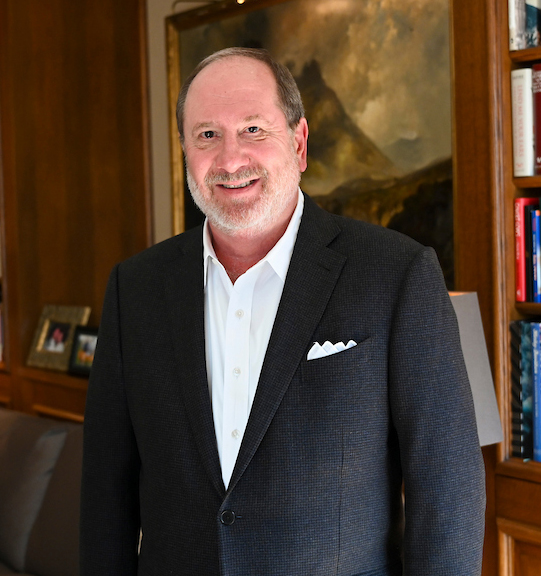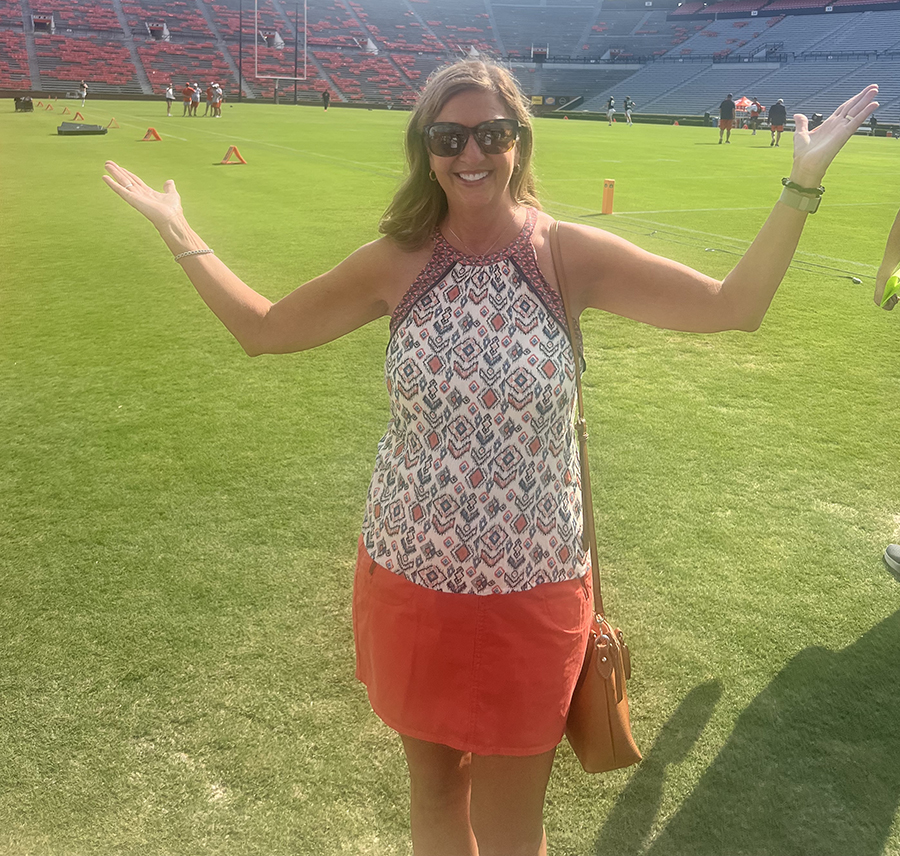
“An Auburn MBA gave me a firm grasp of the concepts that I needed to be an effective
consultant.”
Jim Davis is a problem solver.
Long before today’s luxury of wireless cellular devices, a young Davis once used a
clothes hanger to connect a broken tape recorder microphone with headphones and an
old telephone. “I liked to talk to my friends, but I didn’t want to sit there and
hold the computer or phone up to my ear the whole time while I played games on the
computer,” he said. Instead, he created his own hands-free device.
Today, the facilities maintenance executive continues to solve problems as Maintenance
and Reliability Operations Manager at Chugach Government Solutions, an Alaskan-based
facilities management and technical services company, which maintains a number of
military contracts across the globe.
"One of the ideas that we promote is knowing how to accomplished the larger goals
of our company and our partners," said the 2008 Auburn Executive MBA alumnus who lives in Fayetteville, Tennessee, and works in Huntsville, Alabama. "For
example, I take great pride in knowing that my efforts in improving our asset management
program directly effects how well our military partners can perform their mission,
which directly supports the safety and stability of our nation."
Earning an Executive MBA from Auburn University's Harbert College of Business, however, helps Davis solve problems, too.
“An Auburn MBA gave me a firm grasp of the concepts that I needed to be an effective
consultant,” said Davis, who operated nuclear reactors in the U.S. Navy. “I am routinely
in front of executives and can speak the same language that they are used to hearing
and understand what they are talking about, or their concerns, in a way in which I
would have not been able to had I not gotten the Auburn MBA.
“In a normal organization, operations is separate from maintenance and the two often
clash. Having the operations background with the maintenance background, rolling out
the new computer software, and then picking up the MBA lets me talk to everybody.
I can speak the maintenance language of guys who don’t touch computers, but they turn
wrenches. I understand them. I can talk to the supervisors. I can talk to the computer
guys. It’s easier to communicate when you have done every step of the process yourself.”
 Davis earned an aerospace science degree from Middle Tennessee State in 1999 and enjoyed
a successful career as a computer maintenance management system coordinator at the
Calpine Corporation, but something was missing. “I needed something to differentiate
myself,” he said. “The company paid for you to go to college through a tuition reimbursement
program. I also had the old Montgomery G.I. Bill, but it expires 10 years after you
get out – so I knew that I needed to use it at some point.”
Davis earned an aerospace science degree from Middle Tennessee State in 1999 and enjoyed
a successful career as a computer maintenance management system coordinator at the
Calpine Corporation, but something was missing. “I needed something to differentiate
myself,” he said. “The company paid for you to go to college through a tuition reimbursement
program. I also had the old Montgomery G.I. Bill, but it expires 10 years after you
get out – so I knew that I needed to use it at some point.”
Furthering his education was the obvious step. But where?
“My manager at the time was Aaron Schofield (2004 Auburn MBA alum) and he recommended
the program,” Davis said. “I’m one of those people who will go out and research the
heck out of something, but if somebody I know and trust has good, solid reviews. That
means a lot more than digging around on my own.”
Davis enrolled in Auburn’s Executive MBA Program, which offers working professionals
the opportunity to enjoy a blend of online and on-campus educational opportunities.
The program was ranked No. 20 in 2018 by Ivy Exec.
“I would go into a business meeting within a year after taking a class and the concepts
that I learned were there. The material was related to the real world.”
“You’re working on studies at night at home or in a hotel, or you carve out an hour
in the middle of the day, whenever,” he explained. “The program’s flexibility is one
of its assets that makes it work for you. The flexibility is the deciding factor that
says, ‘Yes, I can do this.’ If the flexibility of a program is junk, then there is
no reason to go there.
“Also, the material was solid. The professors were great. They knew what they were
talking about. The material was timely, too. I would go into a business meeting within
a year after taking a class and the concepts that I learned were there. The material
was related to the real world.”
Online learning with cohorts – spread across the globe – can be challenging, but Davis
found a silver lining in the process. “Doing group projects remotely is challenging,
but that’s hard because it is what it is,” he said. “It’s great when everybody is
in the same room doing projects, but in the real world that almost never happens.
Teams are scattered all over. Having different people on projects at Auburn scattered
across the country was very representing of real life business. You take a deep breath
and find ways to make it work. That’s what you are going to be dealing with when you
get into the business world and Auburn prepares you for that.”


 Degrees & Programs
Degrees & Programs
 Faculty & Staff
Faculty & Staff
 Career Development
Career Development
 Recruiters & Industry
Recruiters & Industry

 Davis earned an aerospace science degree from Middle Tennessee State in 1999 and enjoyed
a successful career as a computer maintenance management system coordinator at the
Calpine Corporation, but something was missing. “I needed something to differentiate
myself,” he said. “The company paid for you to go to college through a tuition reimbursement
program. I also had the old Montgomery G.I. Bill, but it expires 10 years after you
get out – so I knew that I needed to use it at some point.”
Davis earned an aerospace science degree from Middle Tennessee State in 1999 and enjoyed
a successful career as a computer maintenance management system coordinator at the
Calpine Corporation, but something was missing. “I needed something to differentiate
myself,” he said. “The company paid for you to go to college through a tuition reimbursement
program. I also had the old Montgomery G.I. Bill, but it expires 10 years after you
get out – so I knew that I needed to use it at some point.”


